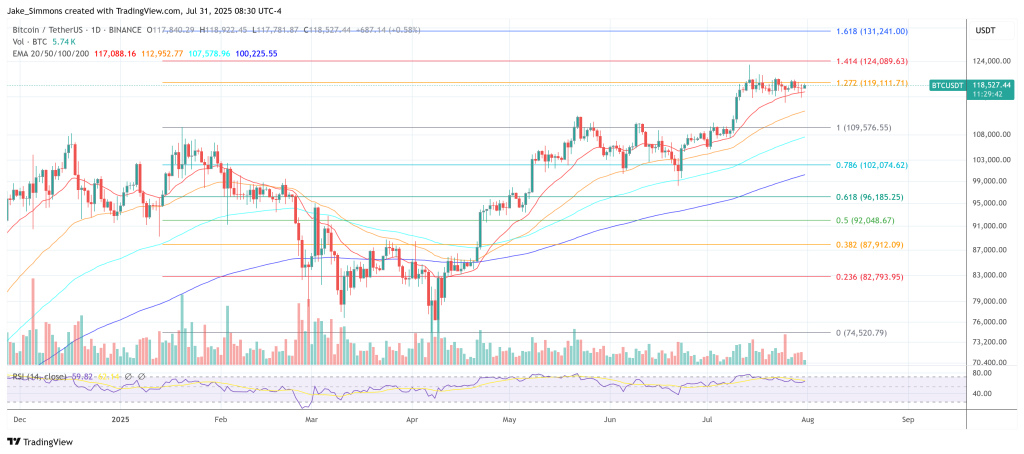The US Securities and Exchange Commission, on a sweltering July 29, performed a bureaucratic pirouette by permitting in-kind creations and redemptions for Bitcoin and crypto exchange-traded products. This dethroned the cash-only constraint—a relic of January’s spot bitcoin launches and spring’s ether funds—that had left investors sweating like teapots in a financial sauna. The agency’s formal statement declared that bitcoin and ether ETPs could now “create and redeem shares on an in-kind basis,” a policy shift so profound it could make even the most stoic Wall Street analyst reach for their smelling salts. “It’s a new day at the SEC,” Chair Paul S. Atkins proclaimed, as if announcing the return of the horse-and-buggy to a room full of Tesla owners.
Bloomberg Intelligence’s Eric Balchunas, with the subtlety of a foghorn, amplified the news on X: “It’s a new day at the SEC…” His post, a masterclass in understatement, highlighted the SEC’s sudden pivot allowing authorized participants (APs) to deliver or receive bitcoin or ether directly. No more routing cash through issuers like a Victorian postman dodging puddles. One might almost call it progress—assuming one still believes in such quaint notions.
Why In-Kind Redemptions Are A Big Deal For The Bitcoin ETF Market
Bitwise President Teddy Fusaro, ever the technical virtuoso, dissected the implications with the flair of a man unearthing a lost Shakespeare sonnet. He argued the shift would eradicate the “recurring frictions” of the cash-creation model—a system where ETFs, faced with inflows, must “go out and buy bitcoin from the market,” typically paying spreads that make one yearn for the days of barter. Fusaro’s example? A $100 million purchase with a 0.02% premium: “That’s $20 [thousand].” A sum, he noted, that doesn’t vanish but instead trickles down to shareholders like a bad omen at a garden party.
In-kind redemptions, Fusaro explained, let APs deliver bitcoin directly, bypassing the “0.02% slippage” that once clung to these transactions like confetti at a funeral. The plumbing behind this, he admitted, is familiar to ETF practitioners but opaque to the average investor. Imagine, if you will, APs assembling creation units in the primary market while issuers scramble to source bitcoin at benchmark prices—plus execution costs, of course. The BRRNY index, calculated during a narrow window each day, serves as an anchor, though real-world fills still incur spreads and market impact. A charmingly chaotic ballet, one might say.
The SEC’s orders, however, were broader than mere operational tweaks. Alongside in-kind relief, the Commission approved a smorgasbord of actions, including exchange applications for dual-asset ETPs, options on spot bitcoin ETPs, and position limits “up to 250,000 contracts.” The agency also hinted at delegated approvals for two large-cap crypto ETPs, all while maintaining its trademark seriousness as if it were hosting a black-tie event for accountants.
Commissioner Mark T. Uyeda framed the move as a correction of an “outlier policy”—a limitation that left crypto ETPs in the dust compared to their gold-fondling cousins. “Unnecessary costs and burdens,” he called them, a phrase that might as well be etched on the SEC’s new mission statement. Market-makers and APs, long lobbying for parity with commodity funds, could finally breathe a sigh of relief—or perhaps a cigar.
From a market-structure perspective, the implications are as concrete as they are mundane. In-kind mechanisms let APs manage bitcoin inventory across prime brokers and custodians without forcing funds to trade at the close. This, in turn, sharpens arbitrage—keeping ETF prices tethered to net asset value like a well-dressed gentleman at a soiree. During volatile sessions, when cash creations might compel hurried purchases above benchmarks, in-kind redemptions offer a respite. A respite, one might add, from the existential dread of overpaying for crypto.
Implementation speeds will vary, of course. Issuers must update AP agreements and custody rails to support in-kind flows—a logistical feat akin to herding cats with a fondness for spreadsheets. But the policy baseline has shifted. At press time, BTC traded at $118,527—a price so lofty it could make even the SEC’s sternest regulator blush.

Read More
- When Bitcoin Mining Gets Tougher Than Your Math Teacher’s Homework 🤯
- PENGU’s Waddling Surge: Pudgy Penguins Hit $2B? 😂
- When Wall Street Meets Bitcoin: A Tale of ETFs and Network Woes 😂
- 🤑 XRP’s Billion-Dollar Love Affair: Evernorth’s Wild Ride to Crypto Glory 🌪️
- Crypto Chaos: Market Meltdown, Trade Twists & Central Bank Confusion
- Binance Sees Massive Dogecoin Whale Stir After 2 Years of Silence – Here’s What Happened!
- Bitcoin Breaks Trendline? 94% Rate Cut Odds! 🚀
- Gold-Backed Crypto Coins Land on Polygon – But Why? 🤔💰
- Strategy’s Secret Bitcoin Vault: The Hidden Truths & Why They Won’t Play Fair
- Cardano QE6? The Big “Maybe” Prediction That’s Keeping Everyone Guessing! 😲
2025-08-01 06:16